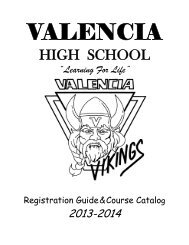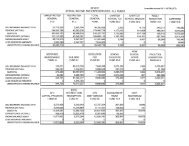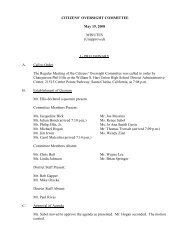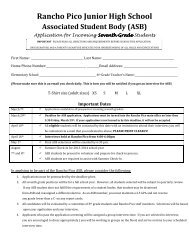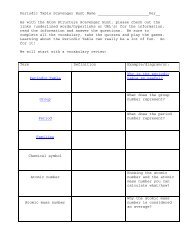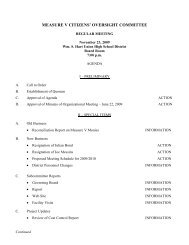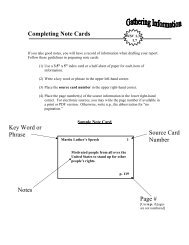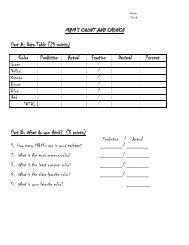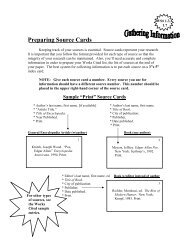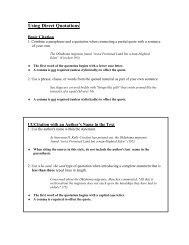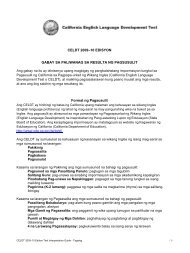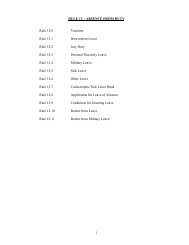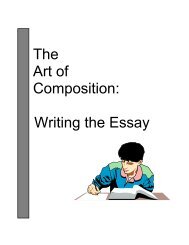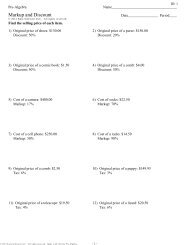Registration Guide - William S. Hart Union High School District
Registration Guide - William S. Hart Union High School District
Registration Guide - William S. Hart Union High School District
You also want an ePaper? Increase the reach of your titles
YUMPU automatically turns print PDFs into web optimized ePapers that Google loves.
PLACERITA JUNIOR HIGH SCHOOL<br />
REGISTRATION GUIDE - 2013/2014<br />
Welcome to Placerita Junior <strong>High</strong>. With “Pride in Excellence” as our motto for over fifty years, Placerita Junior <strong>High</strong><br />
<strong>School</strong>’s staff, students, parents, and community cooperate to serve the student, recognizing the unique characteristics of<br />
early adolescents. In a safe, caring, and healthy environment, we prepare students with academic, intellectual, social,<br />
emotional, and physical skills to help them become positive, productive, capable citizens. Our teachers and staff hold high<br />
expectations for student achievement and behavior; we believe that all students can learn and be successful. We offer many<br />
opportunities for students to grow, including academically challenging courses, a rich variety of exploratory classes, an active<br />
student government, and many school clubs and special programs. We encourage you to become involved in school<br />
activities and make your junior high experience more exciting and rewarding.<br />
Ms. Jan Hayes-Rennels, Principal<br />
Mr. Enrique Lopez, Assistant Principal<br />
Ms. Sherry Rickenbach-Martinez, Assistant Principal<br />
JUNIOR HIGH SCHOOL<br />
Six different teachers for six different subjects.<br />
A place where all students are given equal opportunities to learn.<br />
A school that prepares students for high school, college, and a career.<br />
A safe haven where students and staff respect and appreciate each other.<br />
Opportunities to explore interests, meet new friends, and investigate new activities.<br />
COUNSELING AND GUIDANCE<br />
Our award-winning Guidance Department is adhering to the National Standards for <strong>School</strong> Counseling Programs. The three<br />
counselors facilitate student development in three broad content areas: Academic Development, Career Development, and<br />
Personal/Social Development. They help students develop confidence to solve problems and make decisions on their own.<br />
A counselor is available to work with the students in a variety of ways.<br />
Counseling Services<br />
Testing and group guidance<br />
New student & 6th grade orientation<br />
Parent orientation & referrals to programs<br />
Active Parenting of Teens–English & Spanish<br />
Monitoring student progress and attendance<br />
Credit checks and referrals to intervention<br />
Teenage Grief and other support groups<br />
Class scheduling & class size balancing<br />
Student - parent - teacher conferences<br />
Accommodation of special needs<br />
Extracurricular eligibility<br />
Crisis intervention<br />
Ms. Jody Liss-Monteleone: Students with last names beginning with A – He.<br />
Ms. Susan Villasenor: Students with last names beginning with Hi – Re.<br />
Ms. Christina Noriega-Silvas: Students with last names beginning with Ri – Z plus all English Language Learners.<br />
1
GENERAL INFORMATION<br />
G.P.A.<br />
Grade Point Average. An average of all the grades earned by a student each quarter. An A=4 points, a B=3 points, a C=2<br />
points, a D=1 point, and an F=0 points. The G.P.A. is the total number of points divided by the number of classes.<br />
Grades and Progress Reports<br />
Midway through each of the four quarters, students receive progress reports. Parents should check Infinite Campus, the<br />
online grading program, on a regular basis and expect students to bring home progress reports and report cards.<br />
Quarter<br />
A quarter is approximately nine weeks of school time. There are four quarters in a school year.<br />
Report Cards<br />
Final grades are listed on quarterly report cards. Each quarter is worth fifteen credits.<br />
Student Planners<br />
All students are expected to write down their homework for each class in their student planner. Parents can check the<br />
planner nightly. If necessary, parents can use the following plan.<br />
STUDENT PLANNER INCENTIVE PLAN<br />
1. Remove all entertainment devices (television, stereo, gaming device, computer, etc.) from your child’s room and<br />
move them into a common family area so that you can keep track of what your child is doing in his/her spare time.<br />
2. Decide what activity your child values the most. This might be watching television, speaking on the phone, instant<br />
messaging friends, playing video games, visiting social media sites, etc.<br />
3. Tell your child that there will be NO MORE of that activity UNLESS . . . (steps 4 – 6).<br />
4. Direct your child to write the assigned homework in his/her student planner in each academic class daily. If there is<br />
no homework, your child should write “none.” After class, your child should approach the teacher, who will check<br />
and initial the student planner.<br />
5. After school, direct your child to complete his/her homework in the designated homework spot in your house. Do<br />
not allow your child to watch television or listen to music (unless it’s classical) while the homework is being<br />
completed.<br />
6. When the homework is completed, together with your child, check the homework against the student planner. If<br />
your child has the required four initials (English, history, math, and science) and can show you the corresponding<br />
homework, then he/she can do the valued activity for a specific time period of your choice, perhaps an hour.<br />
7. Your child will test you with this system. He/she will make excuses for no signature and tell you reasons why<br />
his/her planner is not filled out or is wrong. Expect to be challenged and do not cave in! Be consistent and remain<br />
firm that there is no valued activity unless your child adheres to the plan.<br />
Homework During Absences<br />
Parents who wish to request homework for children who are absent for three or more days must do so before 10:00 A.M. in<br />
order to receive the homework after 3:00 P.M. the same day. Please call the office at 259-1551. We encourage students to<br />
call “study buddies” for absences of one or two days. For absences of five or more days, independent study is encouraged,<br />
but must be arranged prior to the absence.<br />
Promotion Policy<br />
A student must accumulate a total of 107.5 credits during the two years to be eligible for promotion to the 9th grade. In<br />
addition, a student must have regular attendance and good citizenship in order to participate in all end-of-year activities.<br />
Credits<br />
Each course earns 2.5 credits if students receive a grade of “D-” or better.<br />
National Junior Honor Society<br />
Students who have a cumulative grade point average of 3.5 meet the scholarship requirement for<br />
membership. These students are then eligible for consideration on the basis of service, leadership,<br />
character, and citizenship.<br />
8th Grade Awards<br />
2
Near the end of 8th grade, there is an award ceremony celebrating 8th graders who have earned outstanding achievement in<br />
English, History, Mathematics, Science, and P.E. Awards for good citizenship and perfect attendance are also given.<br />
Textbooks<br />
Students will be issued textbooks to take home and class sets will be used at<br />
school. Copies of all textbooks are available for students to use in the library.<br />
Textbooks are the responsibility of the student to whom they are issued and charges for replacement of lost books will be<br />
required of that student. Students with damaged books (water, stains, writing, etc.) will be assessed a fine up to replacement<br />
cost. Students need to check their textbooks the day they are issued and report any damage to the librarian immediately.<br />
Lunches<br />
Students may bring their own lunches or purchase a nutritionally balanced lunch that includes milk. Drinks and some food<br />
items may be purchased separately. $4.00 might purchase a hot lunch, drink, and snack. Placerita is a closed campus.<br />
Students are not allowed to leave for lunch.<br />
Bicycles and Skateboards<br />
Students who ride bicycles are required by law to wear helmets. Bicycles must be locked in the designated<br />
area before school begins. STUDENTS SHOULD NOT SHARE LOCKS! Bikes must be walked on school<br />
grounds. Rollerblades, scooters, and skateboards are not allowed on campus at any time.<br />
Cell phones<br />
Cell phones are permitted on campus; however, they must be turned off and placed in backpacks while the student<br />
is in class or in any after-school activity in a building. Students who misuse cell phones will lose the privilege of bringing it<br />
to school.<br />
Lost and Found<br />
If an item is lost, notify the office at brunch, lunch, or before school. Check the office periodically after reporting a lost item<br />
to see if it has been found. Students are urged not to bring valuables to school because of the possibility of loss.<br />
Items such as toys, games, playing cards, skates, skateboards, liquid correction fluid, permanent markers, balloons, flowers,<br />
squirt guns, aerosol sprays, laser pens or pointers, pointed scissors, cigarette lighters, matches, sunflower seeds, or stuffed<br />
animals, etc. are not permitted on campus. Gambling of any sort, including coins or cards, is prohibited. Any flowers or<br />
balloons delivered to school will remain in the office until the end of the day. Students should avoid bringing iPods, Game<br />
Boys, or other electronic devices to school. If they do, the items must not be visible or turned on while the student is on<br />
campus, or they will be subject to confiscation. Visible headphones also will be confiscated. <strong>School</strong> personnel are not<br />
responsible for loss or theft of such items and parents may be asked to retrieve these items from the office.<br />
Visitors to <strong>School</strong><br />
Students occasionally ask if visiting relatives or friends may visit our campus.<br />
For legal reasons, such visits are absolutely prohibited.<br />
Physical Education<br />
It is very important that all students enrolled in Physical Education participate in appropriate clothes suited for strenuous<br />
exercise. For your convenience, appropriate P.E. uniforms with the Placerita logo are available for purchase through the<br />
student’s P.E. teacher. As an alternative, students may opt to wear any appropriate exercise clothing (tee-shirt, shorts,<br />
sweats) in the school colors of solid gray shirt or sweatshirt and solid blue shorts or sweatpants. Please see your PE<br />
teacher with any questions. Garments may have no graphics other than the school logo. Tennis shoes (no slip-ons) are also<br />
encouraged.<br />
All students are issued a P.E. locker for securing their clothes and backpack during P.E. class. The dimensions of the locker<br />
are 18 inches tall x 9 inches wide x 10 inches deep. The lockers cannot accommodate rolling backpacks or binders larger<br />
than 1 1/2 inches. Sharing a locker with someone else doubles the chance of something getting stolen. Lockers or<br />
combinations should never be shared with anyone!<br />
Students must use a school lock that will be issued free of charge during the first week of the semester. If the lock is not<br />
returned at the end of the school year, there will be a replacement charge of $6.00.<br />
To be excused from Physical Education for up to three days for reasons of health, a parent must write a note to the teacher.<br />
Any excuse covering more than three days must be substantiated by a note from a doctor given to the health assistant.<br />
3
WHAT DO I TAKE?<br />
7th Grade Courses<br />
English - 4 quarters<br />
Math - 4 quarters<br />
World History - 4 quarters<br />
Physical Education - 4 quarters<br />
Science - 4 quarters<br />
Exploratory classes – 4 quarters<br />
8th Grade Courses<br />
English - 4 quarters<br />
Math - 4 quarters<br />
U.S. History & Government - 4 quarters<br />
Physical Education - 4 quarters<br />
Science - 4 quarters<br />
Exploratory classes - 4 quarters<br />
ENGLISH COURSE PLACEMENT<br />
COURSE<br />
English 7th<br />
Enriched English 7th<br />
English 8th<br />
Enriched English 8th<br />
REQUIREMENT<br />
None<br />
A score of 450+ on the English/Language Arts Standards Test in 5 th grade<br />
None<br />
A score of 450+ on the English/Language Arts Standards Test in 6 th grade plus all A’s in 7th<br />
grade English OR A’s and B’s in 7th grade Enriched English<br />
MATHEMATICS COURSE PLACEMENT<br />
COURSE<br />
Math 7<br />
Math 7 Accelerated<br />
Math 8<br />
Algebra I<br />
REQUIREMENT<br />
None<br />
Advanced on the Placerita Mathematics Placement Test<br />
None<br />
Successful Completion of Math 7 Accelerated<br />
The Placerita Mathematics Placement Test will be given to incoming 7th graders at the elementary schools during<br />
the week of May 28-31. For absentees and for students not in the Newhall <strong>School</strong> <strong>District</strong>, the test will be<br />
given at Placerita in Room 202 at 3:30 p.m. on Friday, May 31. The test will be given again at Placerita on<br />
7th Grade Processing Day during the afternoon of Friday, August 9. If for some reason, a student cannot attend<br />
Processing Day, special arrangements can be made with a call to the counselor by the first day of school.<br />
The regular mathematics sequence for a university-bound student is Math 7, 8th Grade Algebra 1, 9 th Grade<br />
Geometry, 10 th Grade Honors Algebra 2/Trigonometry, 11 th Grade Honors Pre-Calculus, and 12 th Grade A.P.<br />
Calculus. Colleges care more about the grade earned in Algebra 1 than they do about when it is taken. Remaining<br />
in the mathematics honors track is more important than speeding up the progression of mathematics.<br />
7th Graders who qualify for Math 7 Accelerated will receive a letter from Placerita by July 1.<br />
<strong>School</strong> begins at 8:10 a.m. and ends at 2:35 p.m.<br />
7th grade processing is Friday, August 9, 2013.<br />
First day of school is Thursday, August 15, 2013.<br />
4
COURSE DESCRIPTIONS<br />
English - 7th Grade<br />
The literature-based language arts program is designed for young people with various abilities and skill competencies. The<br />
literature provides developmental reading experiences in various literary styles, and affords opportunities for students to<br />
enjoy, to interpret, and to reflect upon the readings. The language arts activities are an integral part of the literature program.<br />
Major areas of study include the review and development of spelling, vocabulary, grammar, speaking and listening skills,<br />
independent reading, and compositions. Library research, using printed material and technology, and writing skills are<br />
emphasized. Students will access Choices Career Exploration online as a foundation for the 7th grade Careers unit.<br />
Standards-based instruction is the backbone of planning and implementation.<br />
Enriched English - 7th Grade (in addition to English 7 curriculum)<br />
Each quarter, students are responsible for reading 25 points worth of books from the Accelerated Reading<br />
List. Books must be 5.0 reading level or higher. Using the writing process, students write a minimum<br />
of two essays per quarter. No late work is accepted and no extra credit is given. Replacement points<br />
for an assignment may be given for participation in extra curricular contests (i.e. spelling bee, essay<br />
contests, etc.). Students will access Choices Career Exploration online as a foundation for the 7th grade<br />
Careers unit. Students need to maintain a grade of “B” or better to remain in the class.<br />
English - 8th Grade<br />
The literature-based language arts program builds and further develops the competencies introduced to 7th graders. The<br />
literature program extends the reading experiences and opportunities for students. Emphasis is given to the analysis of<br />
character development, setting, plot, and theme. Written composition skills are expanded. A formal research paper develops<br />
library research skills, using technology as well as printed material. Enriched classes are provided for qualified students.<br />
Standards-based instruction guides planning and implementation.<br />
Enriched English - 8th Grade (in addition to English 8 curriculum)<br />
Students write many essay assignments that are supplemented with various other types of writings through journals or<br />
writers’ workshops. Students read four California Young Readers’ Medal books per year. Two additional book reports are<br />
required each quarter. Students complete a unit of selected poetry, which involves research, poetry appreciation, and<br />
interpretation. Students may read two extended novels. No late work is accepted and no extra credit is given. Students need<br />
to maintain a grade of “B” or better to remain in the class.<br />
English Language Learners Level 1<br />
Students will work on developing vocabulary. Students will also be able to understand oral commands and have basic<br />
comprehension of these commands. They will also produce simple vocabulary and be able to create simple sentences. A<br />
great deal of oral practice in English will happen in Level 1. Students will read thirty minutes per night.<br />
English Language Learners Level 2<br />
Students will work on increasing vocabulary. They will respond orally to comprehension questions and write simple<br />
sentences. Students will be able to understand what the teacher is asking and answer questions in English. They will also<br />
practice giving oral presentations, learn how to use the dictionary, and how to write a paragraph to respond to fiction and<br />
non-fiction stories. Students will begin reading short novels and writing essays. Students will read thirty minutes per night.<br />
English Language Learners Level 3<br />
Students will use a textbook to help master English. There will be practicing with writing, working on grammar to make<br />
students better writers, and working on reading skills. Students will read two novels and engage in many activities to better<br />
understand the novels read. Students will work on detailed responses to stories. They will also work on expanding their<br />
vocabulary and using bigger vocabulary words in their written work. Students will read thirty minutes per night.<br />
English Language Learners Level 4<br />
Students will work on 7 th and/or 8 th grade English Language Arts Standards in order to prepare them for a transition English<br />
class, using the 7 th and/or 8 th grade textbook. Students will work on being able to identify the different parts of a story,<br />
understand and identify figurative language, and they will work on learning academic vocabulary words that will be crucial<br />
to their ability to do well on the STAR exam. Students will work on different reading strategies in order to better<br />
comprehend grade level texts. Students will also work on writing and will practice in order to write better paragraphs and<br />
essays. Students will also learn how to proofread their own papers and check for mistakes. Students will read thirty minutes<br />
per night.<br />
5
Math 7<br />
In 7 th Grade Mathematics, students will focus on developing understanding of and applying<br />
proportional relationships; developing understanding of operations with rational numbers; working<br />
with expressions and linear equations; solving problems involving scale drawings and informal<br />
geometric constructions; working with two- and three- dimensional shapes to solve problems<br />
involving area, surface area, and volume; and drawing inferences about populations based on samples.<br />
Math 7 Accelerated<br />
In 7th Grade Mathematics Accelerated, students will focus on developing understanding of and applying proportional<br />
relationships; developing understanding of operations with rational numbers; working with expressions and linear equations;<br />
solving problems involving scale drawings and informal geometric constructions; working with two- and three- dimensional<br />
shapes to solve problems involving area, surface area, and volume; and drawing inferences about populations based on<br />
samples. In this class, students will also cover the curriculum of Math 8.<br />
Math 8<br />
In 8th Grade Mathematics, students will focus on formulating and reasoning about expressions and equations, including<br />
modeling an association in bivariate data with a linear equation; solving linear equations and systems of linear equations;<br />
grasping the concept of a function and using functions to describe quantitative relationships; analyzing two- and three<br />
dimensional space and figures using distance, angle, similarity, and congruence; and understanding and applying the<br />
Pythagorean Theorem.<br />
Algebra 1<br />
This course builds from Math 7 Accelerated. It includes the critical areas from high school Algebra I and content from 8 th<br />
Grade Mathematics. Algebra 1 demands a faster pace for instruction and learning. The students will master the following<br />
critical areas: (1) quantities and rates, including simple linear expressions and equations; (2) interpreting linear and<br />
exponential functions given graphically, numerically, symbolically, and verbally; translating between representations; and<br />
exploring systems of equations and inequalities; (3) using linear models to describe relationships between quantities and<br />
analyzing the appropriateness of linear models; (4) the laws of exponents to include rational exponents, creating and solving<br />
equations, inequalities, and systems of equations involving quadratic expressions; (5) solving quadratic equations; graphing<br />
of quadratic functions; comparing the key characteristics of quadratic functions to those of linear and exponential; specialized<br />
functions to include: absolute value, step functions, and piecewise-defined functions.<br />
SDAIE Mathematics<br />
This course is structured for the English Language Learner who struggles with mathematical vocabulary. It focuses on<br />
mathematical fundamentals – whole number facts, multiplication facts, integers, fractions, and decimals.<br />
World History - 7th Grade<br />
This course introduces students to several ancient world civilizations. It explores the Fall of the Roman<br />
Empire to the Enlightenment. Students will examine the major events and turning points that have shaped<br />
our world today. Extra credit is awarded for participation in the Geography Bee.<br />
U.S. History and Government - 8th Grade<br />
In this course, students study the Colonization of the Americas through the Revolutionary War,<br />
Constitution, Westward Expansion, and Civil War to the turn of the century. The students acquire the skills necessary to<br />
understand how the United States has developed.<br />
Science - 7th Grade<br />
7th grade Life Science prepares students for biology and other related sciences. The class involves lab<br />
investigation and experimentation of topics such as cells, genetics, evolution, and human body systems<br />
including reproduction, sexually transmitted diseases, and safely surrendered babies.<br />
Science - 8th Grade<br />
8th grade science will include three major focus areas. Physics will include force, motion and Newton’s<br />
three laws. Chemistry will cover atoms, molecules, chemical reactions, chemistry of living things, and the periodic chart.<br />
Astronomy will cover space travel and new discoveries, space itself and the objects found in it, and interactions between the<br />
planets and the sun.<br />
SDAIE Science<br />
6
SDAIE Science covers the current science standards with modifications. There are numerous interactive activities in each<br />
unit with a lot of repetition and review. There are many real-life examples and students work together on review activities.<br />
Tests are modified. Life science is taught one year and physical science is taught the next.<br />
Physical Education<br />
All students take physical education every quarter. Physical education is co-ed, but divided by grade<br />
level. Students participate in and are exposed to a wide variety of sports and activities that develop<br />
physical fitness, sports skills, teamwork, and sportsmanship. They acquire knowledge of basic rules,<br />
strategies, and health fitness principles.<br />
All students are issued a Physical Education locker for their P.E. clothes and backpack. The dimensions<br />
of the locker are 18 inches tall x 9 inches wide x 10 inches deep. The lockers cannot accommodate<br />
rolling backpacks or binders larger than 1 1/2 inches. (If a student is required to have a rolling backpack,<br />
please contact the counselor.) Students will be issued locks to use on their P.E. lockers. In Physical Education, students wear<br />
solid gray shirts and solid blue shorts. P.E. clothes with the Placerita logo may be purchased at registration.<br />
EXPLORATORY PROGRAM<br />
Unless designated otherwise, exploratory classes are one quarter and in most cases, students are assigned to the exploratory<br />
wheel. Exploratory classes are subject to change based upon staffing. In some classes, students construct take-home projects<br />
that cost money for materials. If a student cannot afford the cost for these materials, arrangements can be made through your<br />
child’s counselor for funds to be accessed for this purpose.<br />
ART<br />
Art<br />
This course is designed to develop a basic understanding of the fundamentals of design, drawing,<br />
painting, and sculpture through varied art activities. Students are encouraged to explore and<br />
experiment in a variety of media. Creativity is stressed and art history and appreciation is integrated<br />
throughout the quarter. Projects may include color chart, drawing using perspective, kaleidoscope,<br />
value studies, painting, graphic design, collage, sculpture, sand painting, and printmaking.<br />
HOME ECONOMICS<br />
Clothing<br />
Basic construction skills are developed in this course as students complete one or two garments for their<br />
personal wardrobe. Sewing machine use/care, hand sewing techniques, fabric selection, clothing care, and<br />
operation of the sewing machine are emphasized.<br />
Culinary Arts<br />
Class emphasis is placed on developing basic cooking skills and stresses the importance of proper<br />
nutrition in meal planning. Laboratory experiences help students select and prepare foods from a<br />
variety of regional and foreign cuisine, develop proper techniques, and increase self-confidence in the<br />
kitchen. Students analyze and evaluate their dietary habits. A meal will be prepared by the students to<br />
develop their entertaining and social skills.<br />
Home Arts<br />
Students will explore a variety of stitching techniques and home decorating ideas. Emphasis is on color, design, quality of<br />
work, and mastery of learned techniques. Projects may include embroidery, cross-stitch, needlepoint, knitting, crochet,<br />
latchhook, macramé, and quilting. Projects are dependent upon the availability of supplies.<br />
7
INDUSTRIAL ARTS<br />
Industrial Technology<br />
This course is an introduction to drafting, woodworking, metalworking, and plastics.<br />
Emphasis is placed on the problem-solving approach to learning through hands-on<br />
projects. Students will acquire extensive knowledge and skill through the use of hand<br />
tools, bench tools, sheet metal tools, some machining, and soldering. This class will<br />
also explore the possibility of careers in each discipline through educational media and<br />
in class lessons. Additional emphasis is placed on English, mathematics, and science<br />
throughout the curriculum.<br />
MUSIC<br />
Beginning Band<br />
Beginning Band is a two-quarter introductory course designed to develop<br />
fundamental skills necessary for playing an instrument and reading music.<br />
Instruction is provided for woodwind, brass, and percussion instruments.<br />
All students will be provided with a school loaned instrument as inventory<br />
allows. Students graduate into Intermediate Band after two quarters of<br />
Beginning Band. There is no prerequisite.<br />
Intermediate Band<br />
This class is a continuation for those who have had experience in basic woodwind, brass, and percussion instruments. The<br />
music reading is more advanced and is geared for performance. Students have the option of using their own instrument,<br />
renting one, or using one provided on loan by the school. <strong>School</strong> loaned instruments are available for flute, clarinet, tenor<br />
sax, bari-sax, French horn, trombone, baritone, and tuba. Prerequisite: Instructor approval with audition.<br />
Advanced Band<br />
This four-quarter class stresses refinement of tone and a more advanced understanding of basic performance technique.<br />
Intonation, balance, and blend required in ensemble performance are developed. Fun and challenging band literature is<br />
studied with an aim toward accuracy in performance. Students may be required to rent or purchase their own instrument.<br />
Students participate in school concerts, area band competitions, and community performances. Prerequisite: Instructor<br />
approval with audition.<br />
Advanced String Orchestra<br />
This four-quarter class offers advanced instruction in all stringed instruments - violin, viola, cello, bass,<br />
and piano. It is geared to enhance technique in both reading and performing music for students with<br />
prior experience. The school has a limited supply of instruments. Students may be required to rent an<br />
instrument. Orchestra members participate in school concerts, orchestra competitions, and community<br />
performances. Prerequisite: Instructor approval with audition.<br />
Chorus<br />
This four-quarter course develops skills in ensemble singing as well as in understanding structure and meaning of music. The<br />
chorus will perform various styles of choral literature for school concerts, community programs, and local choral festivals.<br />
Requirements include exemplary citizenship and a positive attitude. Prior experience is recommended but not required.<br />
8
MISCELLANEOUS<br />
Associated Student Body (ASB) Leadership<br />
Leadership training is for the student interested in learning basic concepts of democratic government,<br />
leadership, parliamentary procedure, group process, speaking and writing, and organization in practical<br />
school situations. Only 8th graders may pre-register for ASB. 7th graders may be eligible for ASB<br />
after the second quarter. ASB students must have good grades, good attendance, and good behavior.<br />
An interview is a prerequisite to enter the class.<br />
Beginning/Intermediate Dance<br />
These courses are designed to introduce and promote the art of dance and encourage physical, emotional,<br />
and social growth. With a strong emphasis on basic jazz technique, Beginning and Intermediate Dance will<br />
explore several areas of movement. These classes will prove rewarding and challenging for experienced and<br />
non-experienced dancers alike.<br />
Advanced Dance<br />
This is a four-quarter class designed for students who have successfully completed beginning dance or have an<br />
extensive background in dance. Students must audition or gain permission from the teacher to participate.<br />
The Advanced Dance class covers more difficult choreography and technique and students are expected to<br />
create and perform their own choreography.<br />
CSI (Crime Scene Investigations)<br />
CSI introduces students to the scientific methods that crime scene investigators and forensic scientists use to solve crimes.<br />
Students work collaboratively in a lab situation to collect and analyze data. Students are asked to think like scientists in order<br />
to make logical deductions and develop explanations based on evidence.<br />
French I at <strong>Hart</strong> <strong>High</strong> <strong>School</strong><br />
This year-long course for 8th graders is an introduction to the language and culture of France. Emphasis is<br />
placed on vocabulary and communication. Students will begin to develop speaking, listening, reading, and<br />
writing skills in French. Prerequisite: 3.0 G.P.A. and “B” average in English. With teacher<br />
recommendation, successful completion of this course with a “C” or better will fulfill one year of high school<br />
foreign language requirement.<br />
Reading<br />
Reading focuses on reading fluency and reading comprehension. Emphasis is placed on constructing meaning from written<br />
text. Reading for pleasure is also stressed and students read books and share their thoughts in a book club.<br />
Spanish I<br />
This four-quarter course for 8th graders is an introduction to the language and culture of Mexico, Latin<br />
America, and Spain. Emphasis is placed on vocabulary and communicative-based activities. Students will<br />
begin to develop speaking, listening, reading, and writing skills in Spanish. Prerequisite: 3.0 G.P.A. and<br />
“B” average in English. With teacher recommendation, successful completion of this course with a “C”<br />
or better will fulfill one year of high school foreign language requirement.<br />
Student Service<br />
An opportunity is provided for responsible 8th graders with a 2.0 G.P.A. to serve as assistants in the office or<br />
library. Also, students may be utilized to assist teachers in classrooms or physical education classes.<br />
Study Skills<br />
Study Skills is designed to support academic success based on teacher/counselor recommendation. Students learn that study<br />
skills are critical to success in school, essential for acquiring good grades, and useful for life-long learning and job skills.<br />
Yearbook<br />
Students can learn the essentials of digital photography while creating the school yearbook. Students will become an<br />
important part of Placerita’s history while they learn journalism techniques and the value of working as part of a team. No<br />
experience is necessary. This elective requires commitment and is for responsible students only.<br />
9
2013/14 CAMPUS DRESS CODE<br />
Placerita enforces a dress code consistent with all junior high schools in the district. Approved clothing is to be worn to and<br />
from school as well as in class and at all school activities.<br />
Placerita’s dress code supports parents and school officials in their effort to maintain modesty and appropriate dress among<br />
all students. Support of the dress code reinforces the healthy message that children must respect rules and authority both at<br />
school and at home.<br />
DRESS CODE<br />
The official dress code policy is summarized as follows:<br />
CLOTHING WILL BE NEAT, SAFE, AND MODEST.<br />
• Clothing consists of pants, shorts, skirts, t-shirts, polo shirts, sweatshirts, and<br />
jackets.<br />
• Pants must be worn at the waist and may not be excessively baggy or sagging.<br />
• Shorts and skirts must be an appropriately modest length – mid-thigh or fingertip<br />
length when arms are extended at the side. Shorts may not be “cut-offs” and must<br />
have a hemmed edge.<br />
• Leggings and tights are not to be worn as pants, but may be worn under skirts or<br />
shorts.<br />
• Athletic shorts, sweatpants, or dance/yoga pants may not be worn as regular<br />
school clothes. They are only appropriate for dance or Physical Education.<br />
• Shoulders, midriffs, and backs must be completely covered.<br />
• Clothing must conceal all undergarments. No tank-tops, halter tops, spaghetti straps, off the shoulder, or lowcut<br />
tops are permitted.<br />
• Clothing may not be see-through.<br />
• Pants, shorts, and skirts with holes are not permitted.<br />
• No backless shoes, hats, beanies, bandanas, or sunglasses are permitted on campus.<br />
• Baggy oversized shirts are not permitted; they may be no longer than fingertip length with<br />
arms extended at the side.<br />
• Students must lower sweatshirt hoods while on campus.<br />
• No belt buckles with initials or inappropriate symbols are permitted.<br />
• Heavy chains, wallet chains, jewelry with spikes, or other dangerous items are not permitted on campus.<br />
• Lip piercings are not permitted for safety reasons.<br />
• Pajamas, sleepwear, and slippers are not to be worn to school.<br />
• Students are not to write on their own or others' bodies, clothing, or backpacks.<br />
• Clothing and jewelry shall be free of writing, pictures, graffiti, or any other insignia that are crude, vulgar,<br />
violent, profane, sexually suggestive, or that advocate racial, ethnic, or religious prejudice, or that promote<br />
drugs, alcohol, tobacco, weapons, anti-social, or gang activity.<br />
• Upon written request from a parent or guardian and<br />
with approval by the principal or designee, a student<br />
may wear an approved hat outdoors during P.E. or<br />
other school activities for protection from the sun.<br />
• Students who fail to comply with this policy will be<br />
required to call home and have appropriate attire<br />
brought to school or they may be required to change<br />
into their P.E. uniform.<br />
Campus dress code policy is subject to change, especially in<br />
an effort to keep up with contemporary changing fashions.<br />
10
WHEN SCHOOL STARTS, LOOK FOR:<br />
CLUBS<br />
Kid Flix<br />
Book Club<br />
Math Club<br />
Drama Club<br />
Robotics Club<br />
Geography Club<br />
Literary Magazine<br />
Ballroom Dancing Team<br />
Safe <strong>School</strong> Ambassadors<br />
National Junior Honor Society<br />
Club H.O.T. (Help Our Town)<br />
DFY IT (Drug-Free Youth in Town)<br />
Club L.I.F.E. (Student-led Bible study)<br />
STUDENT GOVERNMENT & INTRAMURALS<br />
Activity Days<br />
Assemblies<br />
Basketball<br />
Dances<br />
Dodgeball<br />
Field Trips<br />
Food Days<br />
Magazine Sale<br />
Music at Lunch<br />
Track & Cross Country<br />
WHAT ABOUT DISCIPLINE?<br />
The goal of our discipline policy is to maintain a safe environment where teachers can teach and students can learn.<br />
Learning the most you can in any class requires being able to listen, recite, share, and concentrate without interference.<br />
Placerita protects your right to an education without interference.<br />
Different teachers may have different rewards, punishments, and discipline. In school, just like in the rest of the<br />
world, you’ll find yourself having to adjust to a variety of demands from a variety of personalities. Remember though, that<br />
all of your teachers, counselors, and administrators care about you and desire that you succeed.<br />
Most students rarely have to worry about being disciplined. We do realize that no one is perfect and that some<br />
students have trouble controlling their energy, but an honest, polite attitude with teachers and other staff members is helpful.<br />
We expect all students to obey the following behavior standards:<br />
• Be on time and in your seat with required materials when the bell rings.<br />
• Chewing gum, eating, or drinking will not be permitted in class.<br />
• Writing on school property such as desks, books, or walls will not be permitted.<br />
• Rudeness, profanity, and obscene gestures will not be tolerated.<br />
• Any action or item that is unsafe or that disrupts school is unacceptable.<br />
We also expect:<br />
• NO GOSSIP<br />
• NO PUT-DOWNS<br />
• NO NAME-CALLING<br />
• HANDS OFF OTHERS<br />
• ATTENTIVE LISTENING<br />
• APPRECIATION FOR ALL<br />
THREATS<br />
INSULTS<br />
TEASING<br />
HATE<br />
CRUELTY<br />
PUT DOWNS<br />
Name calling or put downs are not allowed at Placerita Junior <strong>High</strong>. It’s the<br />
rule! Harassment, intimidation, retaliation, and hate crimes are grounds for<br />
suspension or expulsion.<br />
You have the right and the responsibility to report problems. If you have<br />
concerns about your safety, or are worried about the well being of a fellow<br />
student, please talk to a school counselor or other trusted adult. Everyone has<br />
the right to feel safe at school!<br />
11
PLACERITA JUNIOR HIGH 6 th GRADE ORIENTATION, 2013<br />
Orientation for 6 th graders in <strong>Hart</strong> Auditorium<br />
TUESDAY, MARCH 19 FROM 8:30 TO 10:30 A.M.<br />
Pick-up at 8:15 - Drop-off at 11:00 (Newhall is walking.)<br />
Meadows, Newhall, Old Orchard, Peachland, Valencia Valley, Wiley<br />
Counselor Visitations To Elementary <strong>School</strong>s – March 11 - 15<br />
Meadows 1:30 p.m. on Monday, March 11<br />
Newhall 1:30 p.m. on Tuesday, March 12<br />
Old Orchard 1:15 p.m. on Monday, March 11<br />
Peachland 1:30 p.m. on Thursday, March 14<br />
Wiley 1:30 p.m. on Friday, March 15<br />
WEDNESDAY, MARCH 20 AT 7:00 P.M.<br />
Placerita 6 th Grade Family Barbecue and Open House<br />
Orientation for Parents of 6 th Graders in HART AUDITORIUM<br />
Orientation For Spanish-Speaking Parents of 6 th Graders<br />
in PLACERITA’S TANNER HALL<br />
THURSDAY, APRIL 25<br />
Tours for 6 th graders and their parents begin at 5:30 p.m.<br />
Dinner for 6 th graders, their parents, and teachers begin at 5:55<br />
6 th grade parents should email PLRSVP@hartdistrict.org or call<br />
259-1551 to let us know how many people are coming for dinner.<br />
Advanced Band begins playing at 6:45<br />
Open House for all 6 th - 8 th graders and their parents begins at 7:10<br />
Special Education Matriculation Meetings at Placerita<br />
March 4, March 6, March 8, March 12, March 14,<br />
Math Testing at Elementary <strong>School</strong>s<br />
Tuesday, May 28 at 8:15 a.m.<br />
Tuesday, May 28 at 8:15 a.m.:<br />
Wednesday, May 29 at 8:15 a.m.:<br />
Thursday, May 30 at 8:15 a.m.:<br />
Thursday, May 30 at 8:15 a.m.:<br />
Friday, May 31 at 8:15 a.m.:<br />
Friday, May 31 at 3:30 p.m.:<br />
Valencia Valley<br />
Wiley<br />
Meadows<br />
Newhall<br />
Old Orchard<br />
Peachland<br />
Placerita Room 202 for NSD absentees<br />
and for students not in Newhall <strong>School</strong> <strong>District</strong><br />
PLACERITA JUNIOR HIGH is located at 25015 N. Newhall Avenue<br />
across the street from Newhall Park. For further information, call 259-1551.<br />
12



